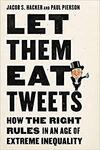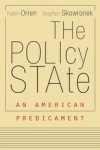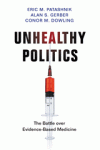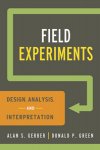Publications
About Our Publications
On this page you will find a list of publications by ISPS Affiliates, including peer-reviewed journal articles, policy briefs, and working papers.
When possible, Publications are linked to Projects and Data via the ISPS KnowledgeBase.
|
Title |
Author(s) | Discipline | Publication | Year |
|---|---|---|---|---|
| To Deceive or Not To Deceive: The Effect of Deception on Behavior in Future Laboratory Experiments |
Julian Jamison, Dean Karlan, Laura Schechter |
Interdisciplinary | Journal of Economic Behavior and Organization | 2008 |
| Too Much Knowledge, Too Little Power: An Assessment of Political Knowledge in Highly Policed Communities |
Vesla Weaver, Gwen Prowse, and Spencer Piston |
Political Science | Journal of Politics | 2019 |
| Toward an Understanding of Structural Racism: Implications for Criminal Justice |
Julian M. Rucker and Jennifer A. Richeson |
Psychology | Science | 2021 |
| Tracking Opinion Over Time - A Method for Reducing Sampling Error |
Donald P. Green, Alan S. Gerber, SL De Boef, SL |
Political Science | Public Opinion Quarterly | 1999 |
| Tragic, but not Random: The Social Contagion of Nonfatal Gunshot Injuries |
Andrew V. Papachristos, Christopher Wildeman, Elizabeth Roberto |
Interdisciplinary | Social Science & Medicine | 2014 |
| Trains, Trade, and Transformation: A Spatial Rogowski Theory of America's 19th-Century Protectionism |
Kenneth Scheve and Theo Serlin |
Political Science | American Journal of Political Science | 2024 |
| Trajectories of General Health Status and Depressive Symptoms Among Persons With Cognitive Impairment in the United States |
Emma Zang, Anna Guo, Christina Pao, Nancy Lu, Bei Wu and Terri R. Fried |
Interdisciplinary | Journal of Aging and Health | 2022 |
| Trajectories of Relapse in Randomised, Placebo-Controlled Trials of Treatment Discontinuation in Major Depressive Disorder: An Individual Patient-Level Data Meta-Analysis |
Ralitza Gueorguieva, Adam M. Chekroud, John H. Krystal |
Medicine | The Lancet | 2017 |
| Treating, Fast and Slow: Americans’ Understanding of and Responses to Low-Value Care |
Mark Schlesinger and Rachel Grob |
Public Health | The Milbank Quarterly | 2017 |
| Trust and Social Collateral |
Dean Karlan, Markus Mobius, Tanya Rosenblat, Adam Szeidl |
Economics | Quarterly Journal of Economics | 2009 |
| Two Centuries of Presidential Elections |
David R. Mayhew |
Political Science | Presidential Studies Quarterly | 2021 |
| Tying Odysseus to the Mast: Evidence from a Commitment Savings Product in the Philippines |
Nava Ashraf, Dean Karlan, Wesley Yin |
Economics | Quarterly Journal of Economics | 2006 |
| U.S. Regional Differences in Physical Distancing: Evaluating Racial and Socioeconomic Divides During the COVID-19 Pandemic |
Emma Zang, Jessica West, Nathan Kim & Christina Pao
|
Interdisciplinary | PLOS ONE | 2021 |
| Unbiased Estimation of the Average Treatment Effect in Cluster-Randomized Experiments |
Joel A. Middleton and Peter M. Aronow |
Political Science | Statistics, Politics, and Policy | 2015 |
| Underpowered Trials at Trial Start and Informed Consent: Action Is Needed Beyond the COVID-19 Pandemic |
Rafael Dal-Ré, Stefan Eriksson, and Stephan R. Latham |
Medicine | Journal of the Royal Society of Medicine | 2024 |
| Understanding the Party Brand: Experimental Evidence on the Role of Valence |
Daniel M. Butler and Eleanor Neff Powell |
Political Science | Journal of Politics | 2014 |
| Understanding the Policy Features That Affect Indians' Support for India's 2070 Net-Zero Goal |
Matthew H. Goldberg, Jagadish Thaker, Eric G. Scheuch, Laura Thomas-Walters, Seth A. Rosenthal, and Anthony Leiserowitz |
Political Science | Climatic Change | 2025 |
| Upward Mobility Context and Health Outcomes and Behaviors during Transition to Adulthood: The Intersectionality of Race and Sex |
Emma Zang and Melissa Tian |
Public Health | Journal of Health and Social Behavior | 2024 |
| US Laws Relating to Decision-Making on Behalf of P |
Stephen Latham |
Bioethics | Book chapter | 2023 |
| Using Cluster Randomized Field Experiments to Study Voting Behavior |
Kevin Arceneaux |
Political Science | Annals of the American Academy for Political and Social Science | 2005 |
ISPS Working Paper Series
ISPS advances interdisciplinary research in the social sciences that aims to shape public policy and inform democratic deliberation. The ISPS network includes scholars and students from many departments in the Faculty of Arts and Sciences and from Yale’s graduate and professional schools as well as select experts from other institutions. The ISPS Working Paper Series provides a platform for ISPS affiliates to make their work available for public consumption and discussion.
Featured Books by ISPS Faculty
ISPS Sponsored Publications
ISPS Politics & Policy Book Series: A series striving to place policy- and law-making in historical and comparative perspective, reflecting the broad, multidisciplinary character of ISPS.
ISPS Journal: A biannual publication that serves to highlight ISPS scholars’ publications and as a development piece for foundations and interested donors.
GOTV website: A website compiling results from a wide array of voter mobilization field experiments. Findings from these scientifically measured studies of various Get-Out-the-Vote methods offer valuable insight into which methods are most effective in mobilizing voter turnout (Note: the website indexes GOTV experiments published before 2006).
The Bulletin of Yale University includes several issues devoted to ISPS (PDF): 2000-2002, 2002-2004, 2004-2006, and 2006-2008.






